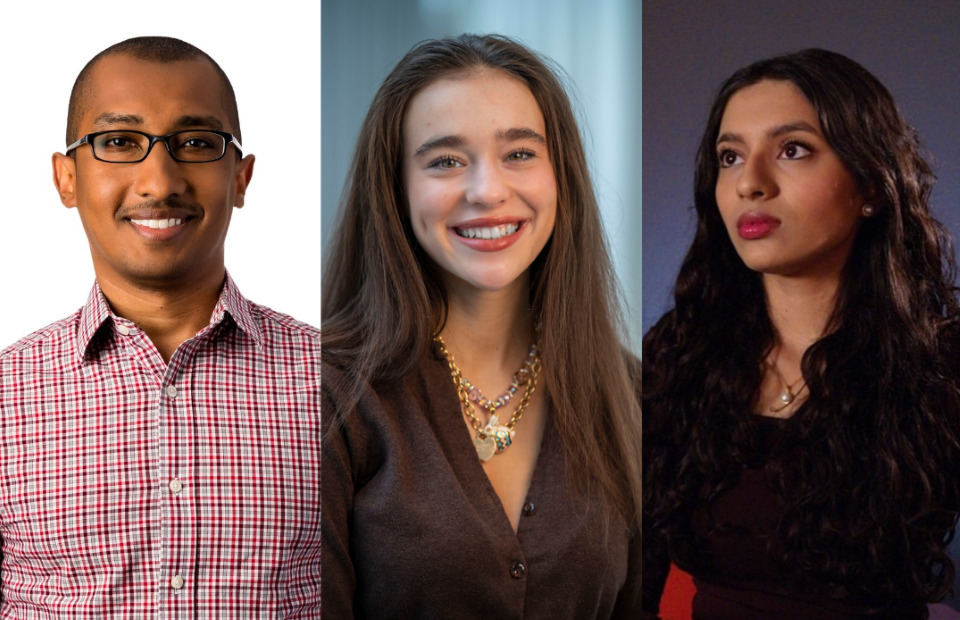These Society alumni are using AI for good

From booming billion-dollar companies to programs like ChatGPT and Midjourney, which are increasingly becoming everyday tools, the power and potential of Artificial Intelligence (AI) are on display as never before. Great power, of course, comes with great responsibility, and the rise of AI and its innumerable capabilities have been accompanied by what may seem like equally innumerable questions. How can educators embrace AI tools while ensuring they’re not used for academic dishonesty? How can we ensure that biases that may exist within training data aren’t propagated through AI outputs? How in danger are we, really, of a robot uprising?
In the face of these big questions, it is important not to lose sight of the many ways that innovators are using AI to advance solutions to important challenges, especially those related to combating racial injustices and making the world a more equitable place for everyone.
As we celebrate Black History Month, we’re proud to share the work of just a few of the countless Society alumni dedicated to building a more just and fair world. From shaping more responsible public policies, to developing cutting-edge tools that are making deep and positive impacts in people’s lives, three alumni of Society competitions stand out for their work in the field of AI, giving us hope for a more inclusive future.
Lester Mackey
Lester Mackey (STS 2003, ISEF 2003) is a computer scientist and machine learning researcher for Microsoft Research, as well as an adjunct professor at Stanford University. Lester works to improve statistical analysis to solve practical problems that will benefit society. Some examples of his research areas include designing a method to predict disease progression rates more accurately in patients with Amyotrophic Lateral Sclerosis (ALS)and developing subseasonal forecasting models for floods and other natural disasters. For his many contributions to the field of machine learning, and his dedication to using AI to tackle real-world challenges, Lester was recognized as a 2023 MacArthur Foundation Fellow.
Learn more about Lester’s work on our Notable Alumni website, or read his interview with Maya Ajmera, President & CEO of Society for Science and Executive Publisher of Science News.
“This is our world. If we don’t take care of it, who will?”— Lester Mackey
Emily Ocasio
Emily Ocasio (STS 2023) is last year’s Regeneron STS 2nd Place Winner. For her research, Emily used an AI model to examine hidden biases in public media. Matching publicly available FBI data with archival Boston Globe articles from the 1970’s and 80’s, Emily quantified the likelihood of crime victims receiving humanizing news coverage based on demographics such as race, gender and age. Through her research, Emily quantified that, for instance, young black men under the age of 18 received 30% less humanizing coverage than their white counterparts. By applying rigorous data models to pressing social issues, Emily is creating new ways to identify and push back against social injustice.
Learn more about Emily in this feature from the Washington Post.
“The word ‘science’ can sound big and scary. But really, science can be as simple as being curious and pursuing answers.” — Emily Ocasio
Sneha Revanur
Sneha Revanur (BCM 2018) is the founder and president of Encode Justice, a nonprofit organization whose mission is to ensure that AI-backed technologies are deployed and regulated in ways that benefit society. Inspired by a ballot measure in her home state of California that threatened to replace cash bail with an algorithm prone to racial bias, Sneha founded Encode Justice to mobilize her community to advocate against the policy. The measure failed and Encode Justice has since grown into a network of 1,000 young people in 30 countries around the world. Aiming to mitigate the risks of AI on a large scale, Sneha and other members of the organization have testified before state legislatures and submitted policy memos to congress regarding AI’s societal impacts.
Read more about Sneha’s work in TIME, where she was named one of the 100 Most Influential People in AI in 2023.
“We are the next generation of users, consumers, advocates and developers, and we deserve a seat at the table.” — Sneha Revanur


